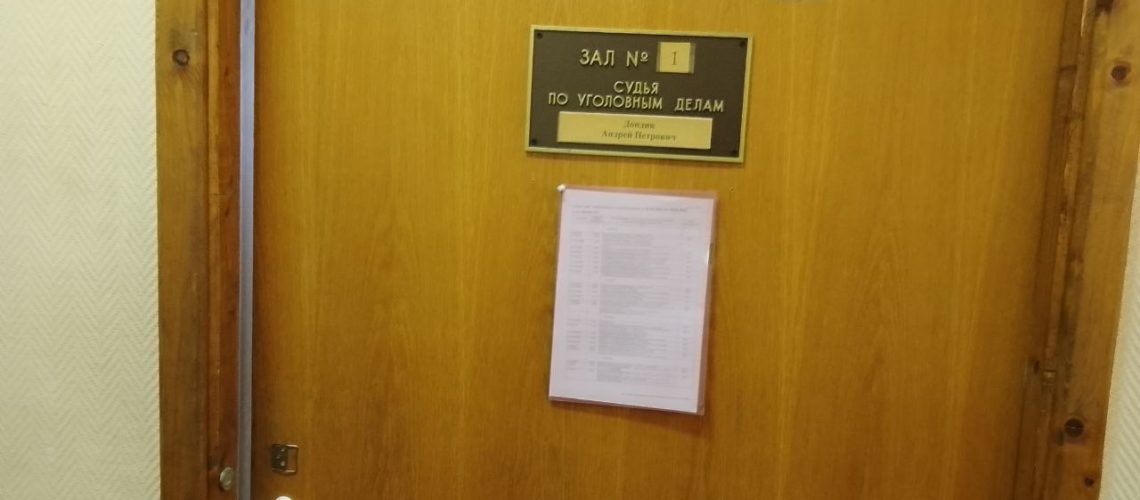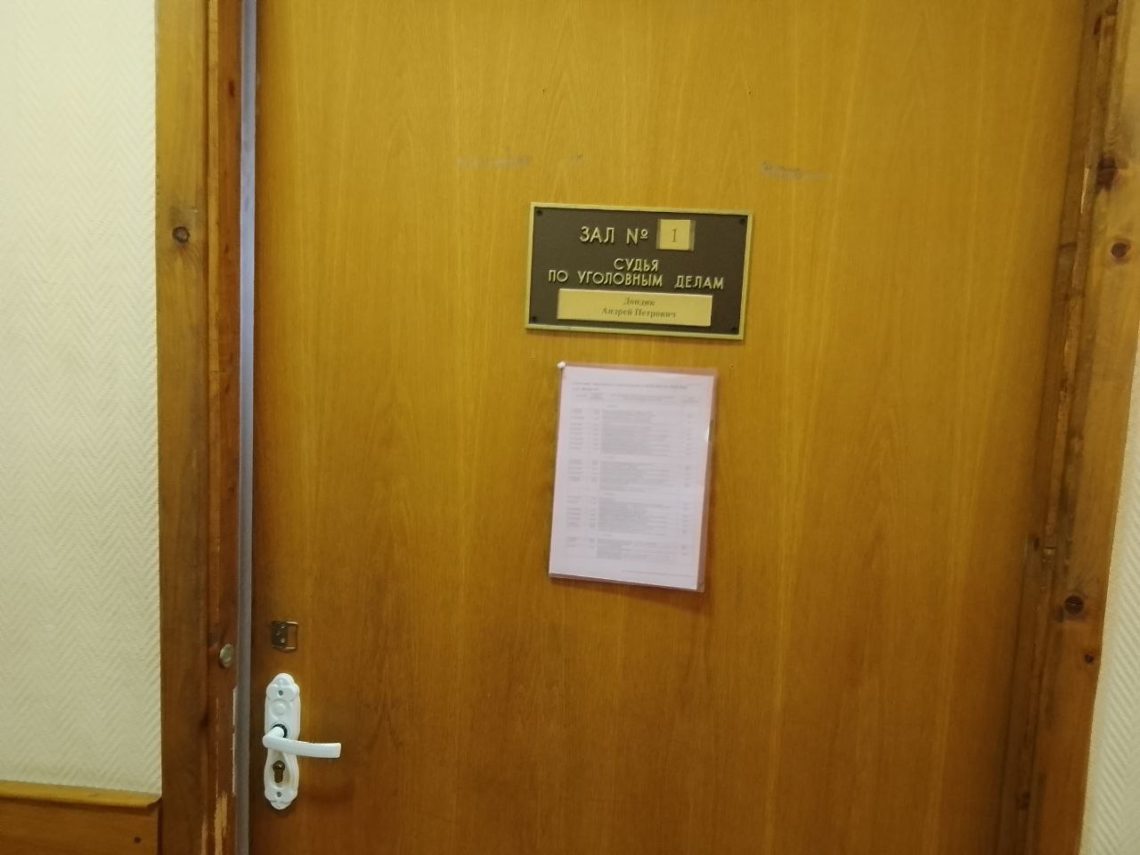

About the case: Nadezhda Filimonova is being charged with discrediting the Russian Armed Forces (Part 1 of Article 20.3.3 of the Code of Administrative Offense of Russia). According to the protocol, on April 29, Filimonova was on Nevsky Prospect, where she conducted a solo picket while holding a placard with an anti-war slogan.
The case is being heard by the Kuybyshevsky District Court of St. Petersburg, with Judge Andrey Petrovich Dondik presiding.
Before the start of the court session, an invited bailiff appears in the courtroom. Later, another bailiff takes his place. Both of them stand near the audience seating throughout the hearing. The second bailiff is mostly situated behind me, which is quite uncomfortable as he can potentially read my notes over my shoulder.
The secretary invites Filimonova and her defense attorney into the courtroom, and I, along with another member of the public, enter with them.
The judge declares the session open and confirms the identity of the individual subject to administrative liability.
Nadezhda Fedorovna Filimonova has not been held administratively liable during the past year. The judge explains to Filimonova her procedural rights under Article 25.1 of the Code of Administrative Offense of Russia (mentioning and correcting, saying “you have the right to familiarize yourself with the materials of the criminal case”), as well as Article 51 of the Constitution of the Russian Federation.
Filimonova requests the admission of Nikita Alexandrovich Sorokin as her defense attorney.
Judge: “Why do you believe that he can represent your defense?”
Filimonova: “Because I trust him.”
Judge: “Does he have knowledge, practice, and education?”
Filimonova: “Yes, he does have knowledge, practice, and education.”
The court grants Filimonova’s request and allows Sorokin to participate as her defense attorney. The judge verifies Sorokin’s identity and explains to him the rights provided for by Article 25.5 of the Code of Administrative Offense of Russia.
Sorokin, the defense attorney, files a motion to familiarize himself with the case file, putting the wrong emphasis on a word in the process.
Judge: “Do you have a law school degree?”. Then, she corrects the attorney, and asks to proceed.
The court grants the motion. A recess is announced to allow the participants to familiarize themselves with the case materials. The hearing resumes 17 minutes later after the participants confirm that they have reviewed the case.
Defender Sorokin requests to incorporate the legal position regarding the case and also submits motions for the questioning of police officers, calling a prosecutor, sending a request to the Constitutional Court of the Russian Federation, and appointing a forensic linguistic examination.
The court decides to proceed with the substantive consideration of the case and defer the consideration of the motions to a later time. Judge Dondik reads the case materials.
The protocol on administrative offense dated April 29, 2022, against Filimonova states that she “committed public actions aimed at discrediting the use of the Russian Armed Forces to protect the interests of Russia, maintain international peace and security, including public calls to obstruct the use of the Russian Armed Forces for these purposes, with her actions not constituting elements of a criminal offense. On April 29, 2022, at around 5:00 PM, while in a public place near house № 35 on Nevsky Prospekt, Filimonova displayed a poster in the form of a piece of paper with an anti-war slogan, thereby publicly urging to obstruct a special military operation conducted by the Russian Armed Forces based on the decision of the Commander-in-Chief, approved by the Federation Council, i.e., she committed an administrative offense under Part 1 of Article 20.3.3 of the Code of Administrative Offense of Russia.”
After reading the protocol, the judge asks for the defendant’s response to the charges.
– Do you admit guilt?
– No, I do not admit guilt.
– Why do you not admit guilt?
Filimonova explains that a pacifist slogan cannot discredit the Russian Armed Forces because, firstly, they are not mentioned in it, and secondly, no specific war or special operation is mentioned. She is against war in general, against violence as a whole, and advocates for diplomatic conflict resolution between states.
After hearing Filimonova’s position, the judge continues to examine the materials, only announcing the names of the documents. These include the protocol on Filimonova’s delivery to the 28th police station of the Main Directorate of Internal Affairs of the Russian Federation for the Central District of St. Petersburg, reports and explanations from the police officers Smolyukha and Gordin who detained Filimonova, copies of their service credentials, photographic evidence of the poster, and a patrol report regarding the deployment of police units on April 29, 2022.
The judge returns to the consideration of the motions and asks the defender for the rationale behind each of them, repeatedly interrupting and interjecting during the responses.
Regarding the motion for the appointment of an examination, Sorokin explains that the police officers believe that the phrase on Filimonova’s poster somehow directly concerns the Russian military forces – an examination is needed to determine how this pacifist slogan discredits them specifically.
A request to the Constitutional Court of the Russian Federation is necessary to examine the constitutionality of the provisions of Article 20.3.3 of the Code of Administrative Offense of Russia.
– Why are you requesting a representative from the prosecution?
– Well, you see, when the judge acts as, let’s say, both the prosecutor and the judge, it’s probably not very proper…
– The judge is not acting as a prosecutor.
– The judge does perform the functions of the prosecution…
– No, the judge does not.
– And takes on the role of the prosecutor…
Dondik, raising his voice:
– The court clarifies to you that it does not take on the role of the prosecutor and examines all evidence.
– Unfortunately, since there is no party representing the prosecution…
– The court clarifies to the defender that the Code of Administrative Offense of Russia does not provide for a prosecution party in this process. As a lawyer, you should be aware of this.
Sorokin also explains that the calling and questioning of police officers are necessary to determine if any of them are women because the video recording shows that his client was detained by a man and a woman. If none of them are women, then one of the police officers is simply lying and was not actually on duty. In addition, there are corrections in the explanations that are not certified by signatures – therefore, they cannot be trusted. It is also necessary to clarify what they understand by “discrediting the actions of the Russian Armed Forces” – specifically, this phrase, considering that it does not mention the Russian Armed Forces or any specific country.
– Have you reviewed the case materials? Copies of the credentials of two men – Police Sergeant Smolyukha and Lieutenant Gordin – have been presented.
– Your Honor, I won’t argue with you, but I will show you the arrest video now so that you simply understand what I’m talking about. I believe you will reconsider who among them is actually a woman. Can we do that?
– Not at the moment, not for this motion.
In the future, neither the court nor the defense party return to the question of the video recording. The court adjourns to resolve the stated motions.
The session resumes after a 15-minute break, and Judge Dondik returns to the courtroom to announce the ruling on the motions. The court decides to deny the following motions:
The motion to incorporate the legal position into the case materials is granted.
The court listens to the explanations of the defendant and her representative. Sorokin, the defense attorney, begins by stating that a recent FSB (Federal Secret Service) examination in a similar case concluded that discrediting the Russian Armed Forces involves anything contradicting the position of the Russian Ministry of Defense.
“I would like to question how this phrase [on Filimonova’s poster] undermines the authority and image of the military forces. Are the Armed Forces really so weak and their reputation so unstable that a simple phrase during a solitary picket discredits them?”
Sorokin highlights that Filimonova conducted a solitary picket, which is allowed under Russian and European law without prior approval. Everyone has the right to express themselves, and in this case, his client expressed her views. She rejects any form of violence, and she expressed her stance against violence in general. Therefore, he believes that there is no administrative offense, and the police officers simply “eliminated” a solitary picket.
Filimonova reiterates that she does not consider the pacifist phrase to discredit the Russian Armed Forces and believes that it cannot discredit anyone in principle.
– Then why did you go out?
– I went out because according to Article 29 of the Constitution, I have the right to publicly express my opinion. I went out to publicly express my opinion that wars should be stopped, all wars, whether it’s in Syria, Ukraine, or anywhere else. All wars should be halted, and all conflicts should be resolved through diplomatic negotiations.
– In principle, this does not contradict the doctrine and the opinion of the President of the Russian Federation,” adds the defender.
After listening to the participants, the court adjourns to make a decision.
After 25 minutes, Judge Dondik returns from the deliberation room and announces the ruling. The entire descriptive part of the court’s decision, starting from the description of Filimonova’s actions, duplicates the content of the protocol on the administrative offense. The court concludes that Filimonova’s guilt is confirmed by the examined evidence. The court then lists all the materials presented by the police, which are considered reliable and admissible, and collectively sufficient. The court finds no reason to distrust them. The court believes that Filimonova’s explanation is a reassessment of the offense committed by her and is given to avoid responsibility for it. This is contradicted by the totality of the evidence presented.
Taking into account Filimonova’s arguments about ending all wars, the content of the poster, given the current political situation, aimed to stop or obstruct the use of the Russian Armed Forces. The administrative offense committed by Filimonova cannot be considered insignificant, and the person guilty of it cannot be exempt from administrative liability because it significantly violates protected public legal relations, regardless of the role of the offender, the extent of the harm, the resulting consequences, and the severity. The court considers, as a mitigating circumstance, that Filimonova has not previously been held administratively liable. The court finds Filimonova guilty of committing an administrative offense under Part 1 of Article 20.3.3 of the Code of Administrative Offense of Russia and imposes an administrative fine of 30,000 Russian rubles.
© 2019-2021 Independent public portal on impartial trial monitoring
